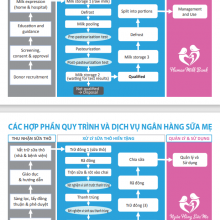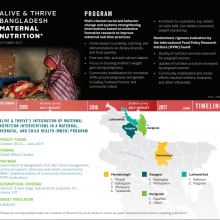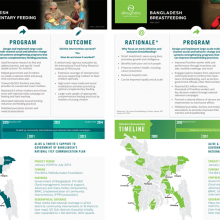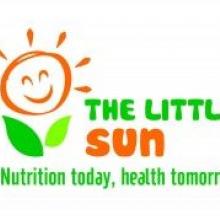Poster/Graphic
Feb 01 2019

Components of human milk bank processes and services
Human milk bank (HMB) services are an essential component of a breastfeeding-friendly health system. HMB services give at-risk infants, such as those born pre-term or low birthweight, access to the multiple benefits of breastmilk when they need it most.
Brief
Oct 15 2017

Integrating maternal nutrition interventions into maternal, neonatal, and child health programs in Bangladesh
This information card gives an overview of the results of the implementation of a social behavior change program on maternal nutrition in Bangladesh.
Journal article
Oct 11 2017

Integrating Nutrition Interventions into an Existing MNCH Program Increased Maternal Dietary Diversity, Micronutrient Intake, & Exclusive Breastfeeding Practices Bangladesh: Results of Cluster-Randomized Evaluation (Nguyen PH., 2017. Journal of Nutrition)
Alive & Thrive evaluated the effect of providing nutrition-focused Maternal, Neonatal and Child Health (MNCH) Program to compared with standard MNCH (antenatal care with standard nutrition counseling).
Poster/Graphic
Jun 02 2017

Breastfeeding and complementary feeding intervention summary and results
These two infographics summarize Alive & Thrive’s work in Bangladesh from 2009 to 2014. The rigorously evaluated intervention resulted in large scale improvements in exclusive breastfeeding and complementary feeding practices.
Journal article
Apr 01 2017

Social franchising and a nationwide mass media campaign increased the prevalence of adequate complementary feeding in Viet Nam: a cluster-randomized program evaluation (Rawat R., 2017. Journal of Nutrition)
Alive & Thrive (A&T) applied principles of social franchising within the government health system in Viet Nam to improve the quality of interpersonal counseling (IPC) for complementary feeding (CF).
Field note
Feb 20 2017

Bridging the generation gap on attitudes about infant feeding
Grandmothers play an important role as caregivers and as advisers to young mothers on infant feeding. Some have called them “guardians of tradition.” This tradition can at times conflict with new ideas, but need not be a barrier.

